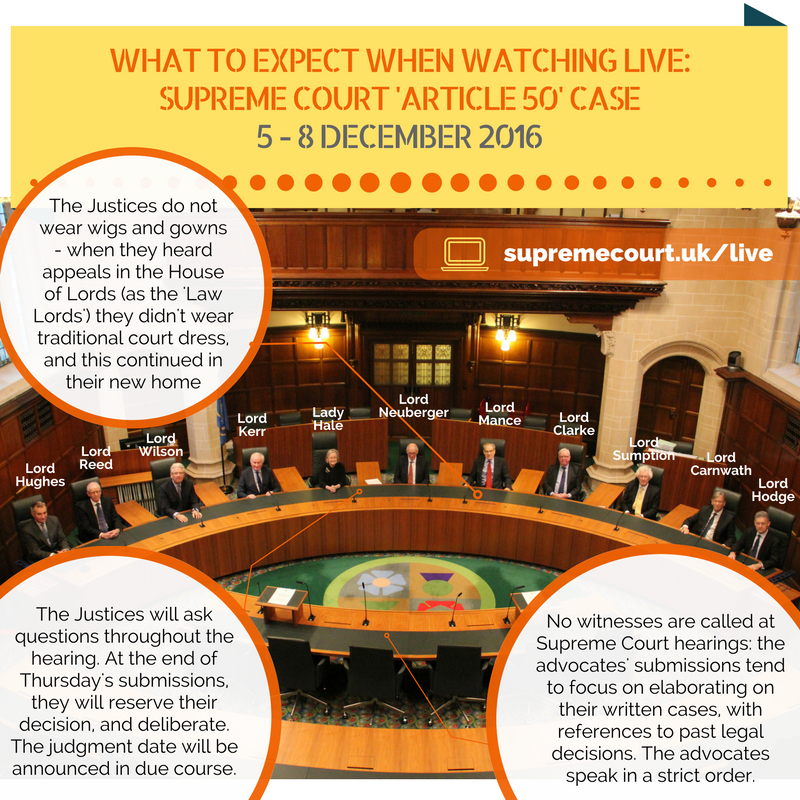In order to leave the European Union, the UK must first send a notice to the European Council, under Article 50 of the Treaty of the European Union (TEU). From Monday to Thursday next week, the Supreme Court will hear three joined cases, all concerned with how the UK must go about doing this.
What are these three cases and who are the parties?
The first case
The first case is an appeal from the decision of the High Court of England and Wales last month (see our explainer of the judgment). The main question is: is an Act of Parliament needed to invoke Article 50 TEU?
The appellant (the party appealing) is the Secretary of State for Exiting the European Union.
The respondents (the parties who brought the original claim and won in the High Court) are Gina Miller, Deir Tozetti Dos Santos and a number of other interested parties.
There are also ‘interveners’. These are people who are not parties to the original case, but join because their rights will be affected by the outcome and they wish to make legal arguments to the Court. They include the Lord Advocate (Scottish Government) and the Counsel General for Wales (Welsh Government).
The second case

The second case is a question from the Attorney General of Northern Ireland, following a challenge by a group of politicians. The main question is: if an Act of Parliament were needed, would the Northern Irish Assembly need to consent before that Act was passed? The original parties were:
- The applicants (the people that made the original challenge) are a group of Northern Irish politicians.
- The respondents are the UK Government, the Secretary of State for Northern Ireland and the Secretary of State for Exiting the European Union.
This question has been sent to the UK Supreme Court by the Attorney General for Northern Ireland.
The third case

The third case is an appeal from the Northern Ireland Court of Appeal, following a challenge from a local campaigner. The main question is: Does leaving the EU change the Northern Ireland constitution, and therefore does it need the consent of the Northern Irish people?
- The applicant is Raymond McCord (a campaigner for victims of paramilitary violence).
- The respondents are the UK Government, the Secretary of State for Northern Ireland and the Secretary of State for Exiting the European Union.
What are the arguments?
The written arguments from each side can be found here. In summary:
On one side

The first respondent (Gina Miller)
- The European Communities Act 1972 (which brought us into the EU) is special as it fundamentally changed the UK
- When the 1972 Act was passed, Parliament did not intend to give the Government the power to repeal it alone.
The second respondent (Deir Dos Santos)
- “Once treaty obligations are committed to domestic law, these laws cannot be removed by simply withdrawing from the treaty.”
- Withdrawing us from the treaty without an Act of Parliament is a breach of Parliamentary Sovereignty (i.e. Parliament must have the last word).
The Lord Advocate (Scotland) and the Counsel General for Wales (interveners)
- As leaving the EU would affect the law making powers of Scotland, Wales and Northern Ireland, their respective Parliament/Assemblies should be asked before invoking Article 50. (For a fuller explanation of when the UK Parliament must put decisions to devolved nations, see here.)
On the other side
The Government (including the Secretary of State for Exiting the EU)
- The ‘royal prerogative’ can be used to make and unmake treaties, even when Parliament has given effect to those treaties via legislation. Therefore, no Act of Parliament is needed.
The Attorney General for Northern Ireland
- Invoking Article 50 TEU will not actually affect an Act of Parliament. The European Communities Act 1972 will still exist until it is repealed.
- Northern Irish law does not require an Act of Parliament for an Article 50 notice to be given.
What will happen at the Supreme Court?

Lawyers for each party will have a turn to address the Court, explain their arguments and be asked questions by any of the judges. A timetable of when each party will address the court can be found here.
All 11 justices of the Supreme Court will be sitting. This is the first time it has happened. Usually the court consists of a maximum of nine Justices. Here is a nice Supreme Court infographic!
Where you can watch it?
If you want to see the action, it will be live streamed here.
Other good sources
- Joshua Rozenberg has written a two part piece for Full Fact:
- The UK Supreme Court ‘Article 50 Hub’
- The UK Supreme Court blog will be live blogging
- Follow the UK Supreme Court on Twitter
- Follow RightsInfo on Twitter
Feature image by Tom Morris, used under Creative Commons Attribution-Share Alike 3.0 Unported license.. Supreme Court infographic from UK Supreme Court twitter. Image of Stephen Agnew, the Green Party’s Northern Ireland leader. One of the applicants. Source: http://www.greenpartyni.org/







